
Top 11 Marketing Research Tools For 2024: A Comprehensive Comparison Guide
Billionaire investor and serial entrepreneur Mark Cuban once said “Marketing isn’t about selling, it’s about helping.”, and this quote stuck with me as one of the most potent marketing quotes of all time. Good marketers often invest their time and resources to identify customers’ problems and then figure out how to solve them with their products. That’s why marketing research tools hold undeniable value in the realm of marketing.

These tools offer rich consumer insights facilitating a customer-centric approach when launching products or new marketing campaigns. Moreover, organisations spend millions conducting new research through conventional avenues like Surveys and focus groups, while these marketing research platforms offer the same level of insights for a fraction of the price, even for free sometimes.
In this blog, we will discuss the top 11 marketing research tools that offer a window into the minds of consumers and allow marketers to keep customers at the centre of every decision they make.
Top 11 Marketing Research Tools for 2023
-
Google Trends
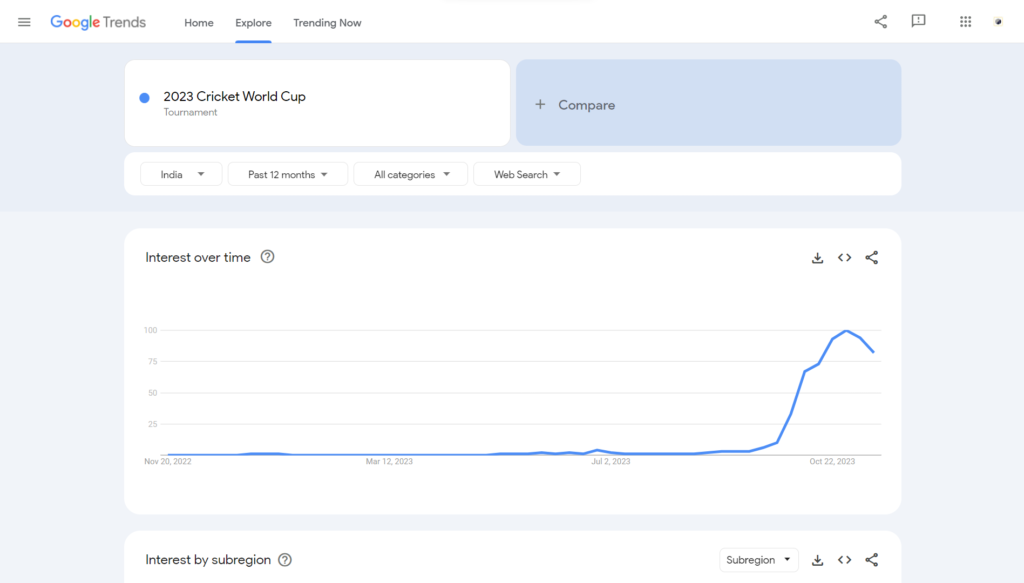
Google Trends is a potent and free marketing research tool that tracks the popularity of specific search terms in Google searches. It aids in comparative keyword research, helping marketers identify the most relevant and high-performing keywords for campaigns. Moreover, it offers geographical data, enabling tailored marketing efforts to specific regions or demographics for maximum relevance.
When it comes to content marketing and SEO, Google Trends can be a game-changer. Marketers can identify what topics are currently in demand, enabling them to create content that resonates with their audience. This not only boosts website traffic but also helps establish thought leadership within their industry.
Pros:
- Google Trends is a free tool
- Tracks changes in keyword popularity over time.
- It offers fine-grained data, customisable based on location, time frame, and category.
- Marketers can compare multiple terms to make data-driven decisions.
- The tool provides real-time data on trending topics
Cons:
- Data from this software is specific to Google’s search engine
- The data doesn’t provide the exact search volume
- Doesn’t cover other digital marketing channels like social media or email.
- Not all trending topics may be relevant for businesses
2. Tableau
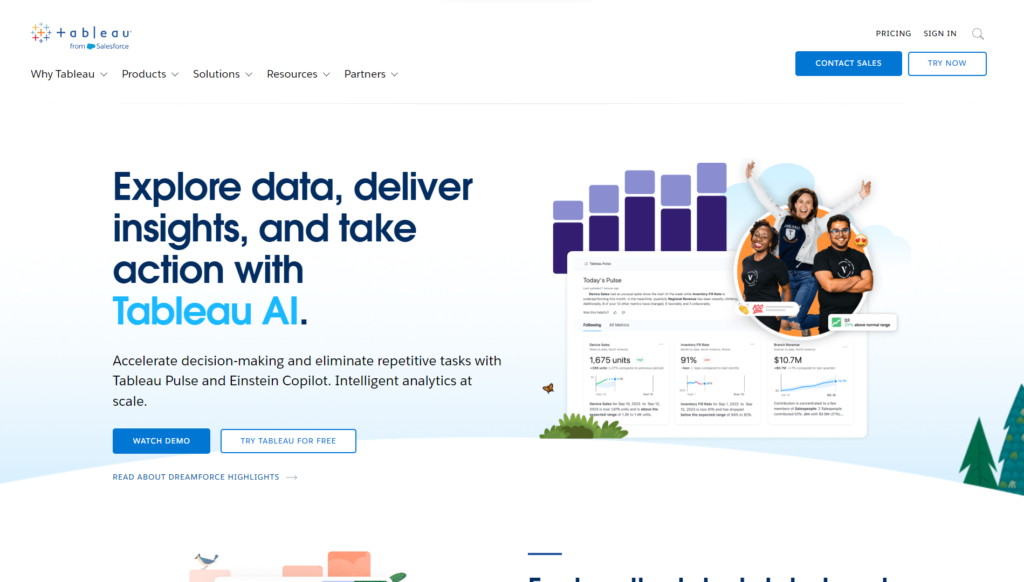
Tableau is a versatile data visualisation tool that simplifies complex data by transforming it into intuitive visual formats. As a marketing research platform, it has multiple use cases.
For instance, it excels in data visualisation, allowing marketers to convert marketing data, such as website traffic, social media metrics, and sales figures, into interactive charts and graphs.
It also enables marketers to create customised dashboards that display essential performance indicators and real-time data, offering a quick overview of marketing campaign performance.
Moreover, Tableau’s data blending capability helps integrate data from multiple sources, offering a holistic view of marketing efforts. The tool promotes collaboration, allowing marketing teams to share visualisations, reports, and insights, facilitating data-driven decision-making and teamwork.
Pros:
- User-friendly interface
- Connects to a wide range of data sources
- Users can perform real-time analysis
- Custom dashboards and visualisations
- The tool supports collaborative work, enabling teams to work together on data analysis and insights.
Cons:
- Tableau can be expensive for businesses
- While it is user-friendly, mastering Tableau’s more advanced features requires time
- Large datasets may slow down performance
- Understanding and managing licensing options can be complex
3. Statista
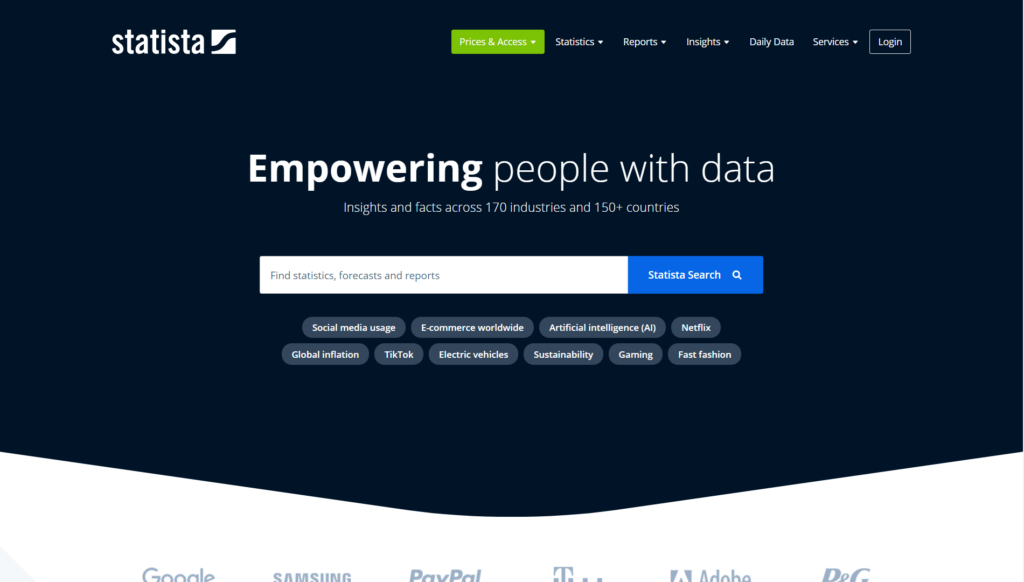
Statista is a robust and comprehensive statistics portal that offers marketers a wealth of data and insights across various industries and topics. With data aggregated from over 18,000 sources and covering more than 60,000 subjects, it serves as one of the most valuable marketing research platforms ever. It organises data into 21 market sectors, including media, business, finance, and politics.
It allows users to transform data into easily digestible visual formats. Marketers can create a variety of charts and graphs in formats like PDF, Excel, and PowerPoint, which is particularly useful for presentations and projects. One of the most notable features of Statista is its commitment to providing real-time updates.
Pros:
- Statista offers data on a wide array of topics
- The platform simplifies data presentation
- Statista ensures that data is continuously updated
- It streamlines the research process, saving marketers time and effort
- The platform aggregates data from reputable sources
Cons:
- Statista does not conduct original research
- Access to Statista’s full suite of features may come with a hefty subscription fee
- While it offers various chart formats, customization options are limited for users
4. Dooblo
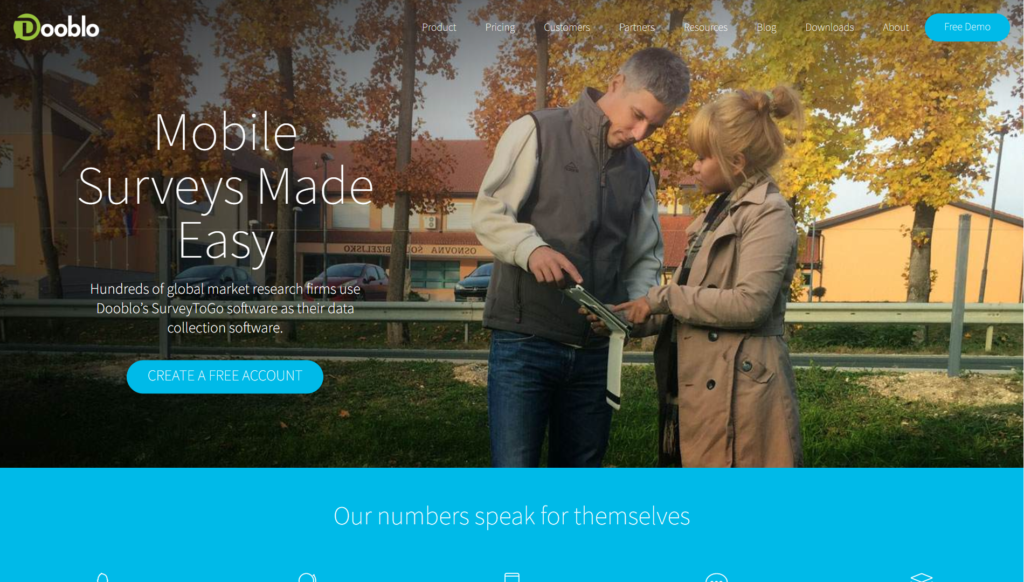
Dooblo is a prominent survey data collection software made for Android mobile devices, tablets, and PDAs. It supports market research companies in conducting field surveys, specifically Computer-Assisted Personal Interviewing (CAPI). A standout feature of Dooblo is the ability to create mobile surveys efficiently, allowing users to design surveys that function seamlessly on various devices in less than 20 minutes.
The feature to add multimedia elements within surveys is another highlight. Users can easily capture photos, sound recordings, and videos, adding depth and context to the collected data. Dooblo provides real-time GPS tracking of interviewers, ensuring that users can monitor the location of survey activities in real time.
Pros:
- Dooblo uploads data on cloud servers in real time for instant accessibility
- Dooblo streamlines the data collection process, making it efficient and responsive.
- The software runs multiple quality control tests like GPS tracking and suspicious interview flagging to ensure the reliability and accuracy of the data collected.
Cons:
- Dooblo doesn’t support multiple languages
5. Insights Pro
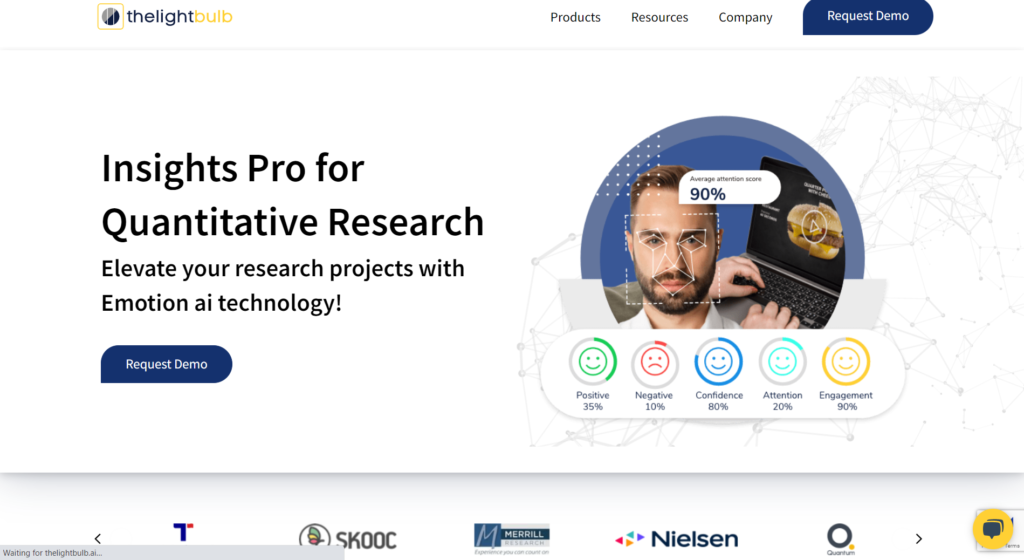
Insights Pro is an AI-based emotional insights tool that combines emotional intelligence with new-gen AI tools like speech transcription, facial coding, text sentiment analysis, and eye tracking to generate an emotional heatmap from a remote or live interaction. This is a truly unique tool that makes traditional market research strategies like surveys, interviews, and focus groups emotionally transient.
This tool offers use cases across multiple marketing channels. It can be used for testing video ad creatives to boost ROI across performance marketing campaigns, or it can analyse remote interactions between a customer and a product to uncover deep consumer insights. The product also has critical use cases across sales circles making it one of the most complete marketing research software out there. You can read this detailed case study on How Insights Pro can help uncover emotional insights to better understand the utility of this marketing research platform.
Pros:
- Works across platforms and offers great interoperability
- A central dashboard to access all emotional insights
- Multiple filters to segregate data
- Integrates with calendar to join meetings automatically
- Option to analyse pre-recorded videos or have the software join live meetings for emotional analysis
Cons:
- The UI is less intuitive and might be tricky to use in the beginning
6. Cint
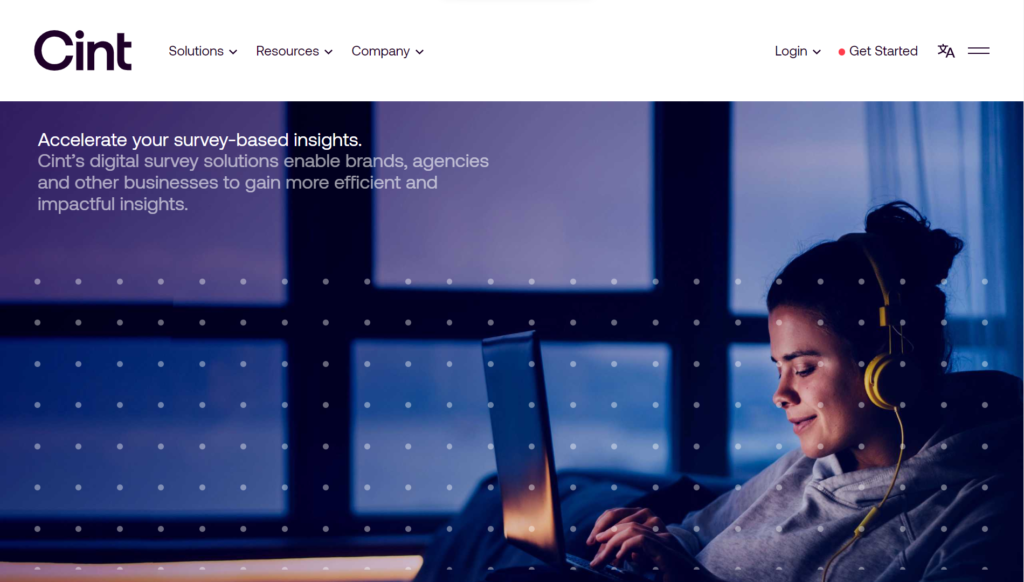
Cint is a global leader in digital insights gathering, offering a platform that accelerates the task of obtaining consumer insights. The platform boasts the world’s largest consumer network for digital survey-based research, encompassing over 144 million respondents across 130 countries. Over 2,500 insights-driven companies, including SurveyMonkey, Kantar, and GfK, utilise Cint to enhance their consumer insights collection and business growth. While users love Cint for capturing valuable insights from consumers, the platform’s media measurement capabilities receive some criticism.
Nevertheless, Cint’s customization enables tailored outcomes based on brands’ KPIs, offering digital surveys for specific target groups. It assists agencies, brands, and researchers in identifying the right target audience for online surveys, streamlining respondent sourcing and survey cost estimation, and providing fast and accurate insights.
Pros:
- Access to a vast network of over 144 million respondents in 130 countries.
- Highly efficient and customizable digital surveys.
- Helps brands create impactful outcomes.
- Delivers fast, flexible, and accurate survey results.
- Trusted by over 2,500 insights-driven companies.
Cons:
- Users reported media measurement capabilities lacking.
- There have been suggestions to enhance visualisation for better outcomes.
7. NielsenIQ
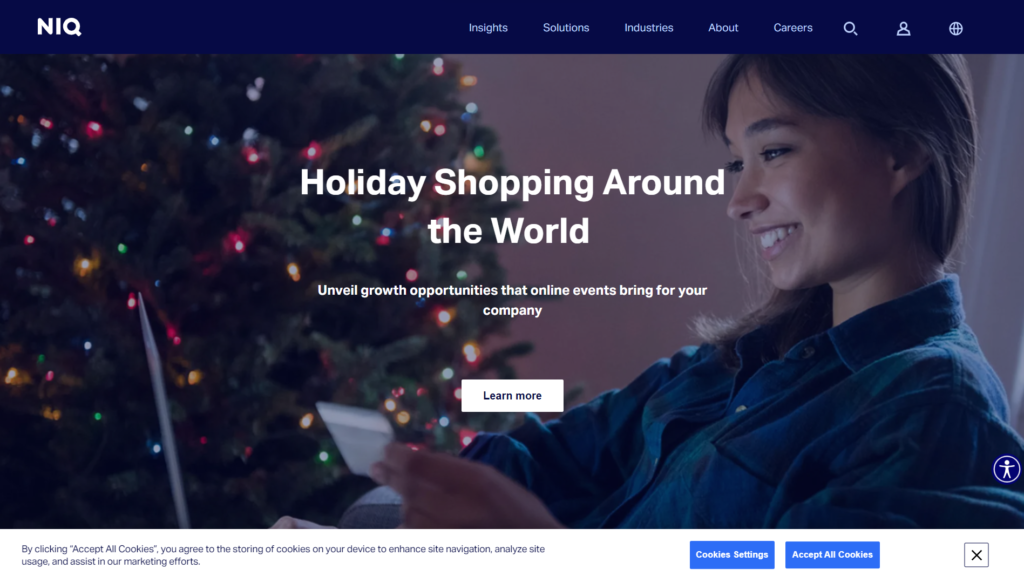
NielsenIQ is a prominent retail and consumer intelligence consultant that collaborates with businesses to gather consumer insights, determine the most effective distribution channels for products, and develop a product range tailored to the preferences of their target customers.
One distinctive feature of NielsenIQ is that it operates as a consultant rather than a self-service software, making it particularly suitable for established firms with substantial product launch budgets.
As a global leader in consumer intelligence, NielsenIQ offers a profound understanding of consumer purchasing behaviour and opportunities for growth. In 2023, it joined forces with GfK, to boost its global presence. NIQ, which is part of the Advent International portfolio, operates in over 100 markets, covering more than 90% of the world’s population.
Pros:
- The software offers a deep understanding of consumer behaviour.
- Provides forecasting data for product launch performance.
- Operations in over 100 markets, covering most of the world’s population.
- Delivers a full view of consumer intelligence.
Cons:
- More suitable for established companies with more capital.
- Operates as a consultant, not self-service software.
8. Pew Research Center
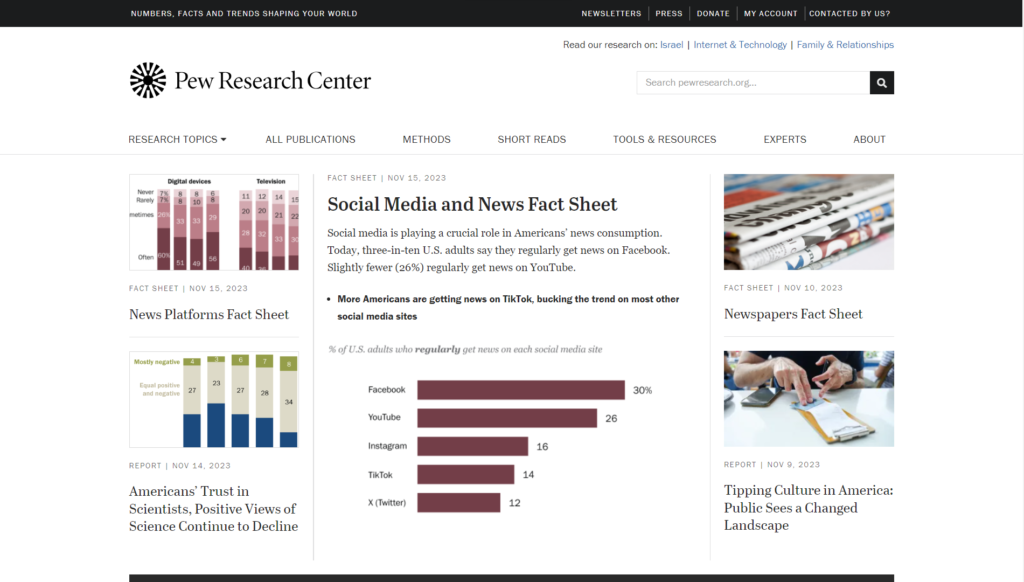
Pew Research Center is a nonpartisan fact tank that conducts extensive research on various issues, attitudes, and societal trends. As a marketer, it’s an invaluable resource. The Center offers a wealth of free research on topics such as U.S. politics, digital media, social trends, religion, science, and technology.
These insights are vital for understanding your target market and making data-backed decisions. The interactive articles on their website allow for in-depth exploration, facilitating the extraction of granular, targeted insights. Pew Research Center’s rigorous research methods and commitment to transparency ensure that the information you access is credible and up-to-date, making it an essential tool for marketers to stay informed and make informed strategic choices.
Pros:
- Provides in-depth data on diverse societal topics.
- Ensures impartial and credible information.
- Allows for detailed, targeted insights.
- Valuable resources available at no cost.
- Commitment to methodological integrity and data accuracy.
Cons:
- Pew Research Center doesn’t conduct original data collection.
- Research is pre-defined, limiting customization for specific marketing needs.
9. Semrush
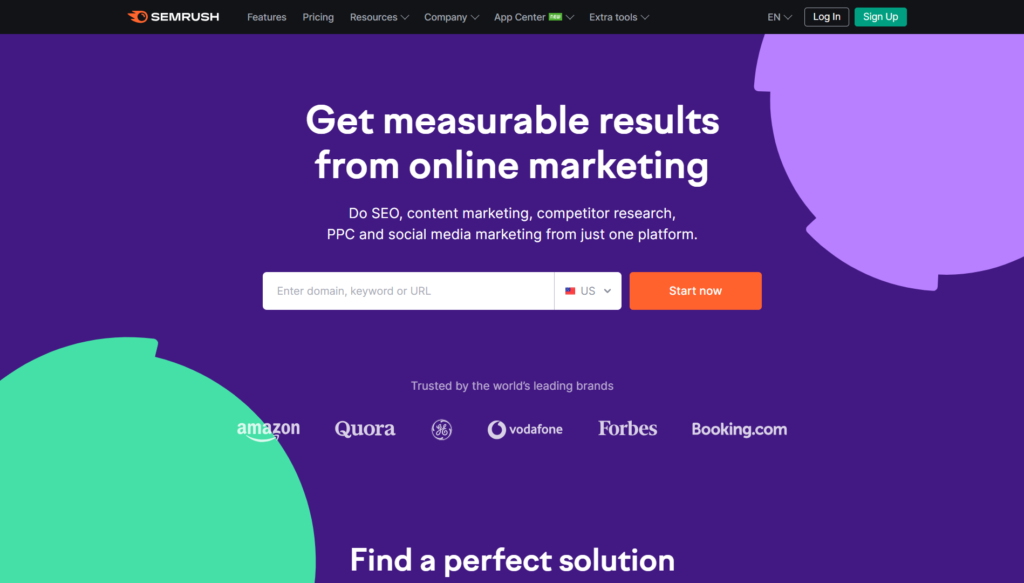
SEMrush is one of the most comprehensive digital marketing tools offering over 40 features to boost online visibility and conversions. It excels in SEO, PPC, SMM, keyword research, competitive analysis, PR, and content marketing. As a marketer, SEMrush is invaluable for several reasons. It provides insights into campaign performance, tracks keyword rankings, and offers vital competitor analysis. Identifying valuable keywords is simplified, helping you drive relevant traffic.
Moreover, SEMrus helps retain existing traffic while attracting new visitors. It also assists in earning high-quality backlinks, which enhance your site’s authority and trustworthiness. With SEMrush, you can refine your digital marketing strategies, stay ahead of competitors, and drive meaningful results.
Pros:
- SEMrush offers a wide range of digital marketing features.
- Monitors and reports campaign performance.
- Identifies valuable keywords and competitor strategies.
- Boats multiple tools to keep existing traffic engaged.
- Aids in earning valuable backlinks for site authority.
Cons:
- Some users find the training docs challenging.
- The backlink dashboard could be improved in terms of coverage.
10. Think With Google
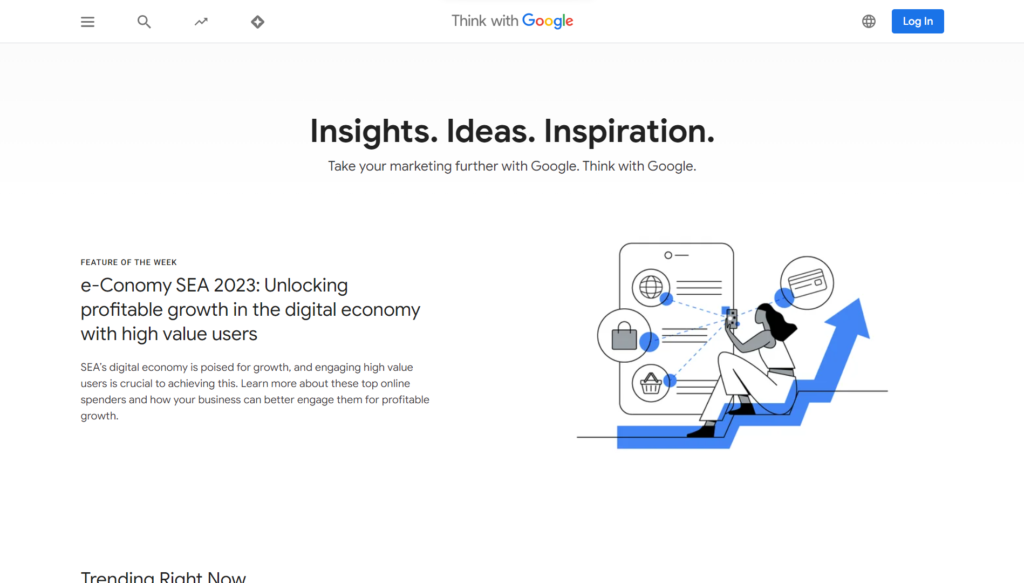
Think With Google is one of the best marketing research platforms, offering a wealth of insights and tools to enhance marketing strategies. It’s a one-stop hub for monitoring consumer behaviour, gaining marketing insights, and staying updated on industry trends.
As a marketer, Think With Google provides several benefits. It allows you to conduct site audits to improve website speed and user experience, offering custom tips for enhancement. You can explore trends and consumer insights for specific locations, track emerging technologies for future strategies, and benchmark your website’s performance against industry standards.
Pros:
- A free online repository with global consumer behaviour data.
- Valuable insights for market exploration and audience targeting.
Cons:
- Few advanced features for niche or sub-category research.
11. BuzzSumo
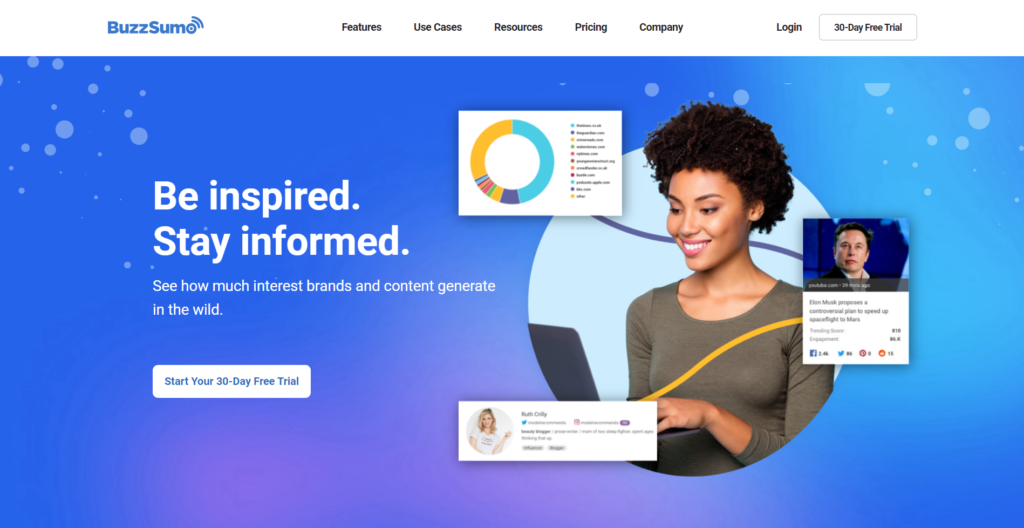
BuzzSumo is one of the top marketing research tools for people looking to enhance their content marketing and research efforts. It boasts a variety of features to create high-performing content, perform keyword research, conduct competitive analysis, and monitor your brand’s presence.
This tool offers real-time insights into viral trends across domains, topics, and locations. You can track newly published content related to your target keywords, identify influential figures for potential brand collaboration, and set up alerts for specific keywords, blogs, mentions, competitors, and influencers.
BuzzSumo’s strengths lie in its ability to provide accurate social share counts, making it a powerful resource for competitor research.
Pros:
- Excellent for social listening and keyword research.
- Chrome extension simplifies campaign performance monitoring.
- Accurate social share counts and valuable for competitor research.
Cons:
- Doesn’t monitor content or engagement data for Instagram posts.
- Could benefit from improved content filtering and more comprehensive social media channel coverage.
Conclusion:
These research and digital marketing tools allow marketers to assess market conditions and anticipate consumer behaviour ahead of a product/campaign launch without having to spare too much money or time on conventional market research techniques.
Having access to the right data at the right time is the perfect ingredient for an impeccable marketing strategy. And while there are other ways to collect data, these tools make the process quicker and more efficient facilitating a smoother marketing experience for users.











